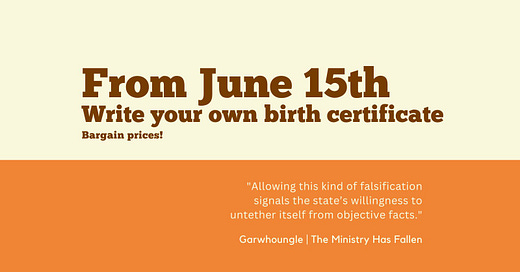June 15: Write your own birth certificate, bargain price: $55.00
Birth certificates may now reflect facts or feelings
So since June 15, when the Births, Deaths, Marriages and Relationships Registration Act 2021 (BDMRR) came into effect, anyone over 18 can change the sex recorded on their birth certificate1. The criteria to make the change are (1) the person identifies with their nominated sex; (2) they understand the consequences of changing their sex; and (3) nah, that’s it, there is no 3.
Birth certificates, a government issued certificate of evidence can now, if you choose, reflect a lie. A lie, which even if you really really really want it to be true, is still a lie. By lie, I mean we can now change official documents to say something happened that did not happen—that a boy was actually born a girl or a girl was actually born a boy. Allowing this kind of falsification signals the state’s willingness to untether itself from objective facts.
Single-sex spaces still allowed
Some would like BDMRR to be a more significant win against women’s rights than is actually the case. As Speak Up For Women have explained, the new law does not mean that those providing women-only services and facilities must now expand their clientele to include anyone who holds a certificate saying that they are a woman. It is still up to service providers to set their own criteria around sex. The Human Rights Act 1993 explicitly allows for female only spaces and services and does not consider them discriminatory. BDMRR does not change this2.
Difference between sex and gender actually embedded in the new law
What is significant is that BDMRR clarifies in NZ law, that gender and sex are different things. The explanatory note in Supplementary Order Paper 59 which explains the intent of the legislation, refers to sex and gender and sex or gender. Listing both terms acknowledges that these words are not murky synonyms that can be exchanged at will3 but rather are separate concepts with distinct meanings.
20 June: BSA issues a new decree
The Broadcasting Standards Authority, clearly a bit fed up with hearing from New Zealanders pissed off about bias in the media on the whole gender thing, handily issued guidance to anyone thinking of complaining ever again. Hear ye, hear ye New Zealanders. Free and frank exchange of opinions is BSA’s bag but let’s be clear about how we get there. As far as I can make out here’s what they say:
We must not deadname4 (this is denigration)
We must not misgender5 (this is denigration)
We can call women people with cervixes (this is not denigration)
We can call women TERFs (this is not denigration)
“Complaints referring to, or relying on, transphobic stereotypes are unlikely to succeed and the BSA may decline to determine them” (this is denigration)
Okay, got it. Trans people must be called by the name and sex that they identify with, but it’s perfectly okay to ignore complaints by women who want to be called the sex that they actually are. Also, we’ll ignore complaints about women being called TERFs, a slur used to ridicule women’s views and to justify advocating violence against women.
What’s more the BSA have issued themselves a get out of work certificate by saying that they will ignore any complaint that relies on variations of transgender tropes or on stereotypes about transgender people. A variation of a trope, much like a gender identity, could be absolutely anything. If they don’t like the cut of your jib, BSA gets to ignore you. Way to go with the free and frank exchange of opinions there guys.
These handy guidelines were issued just five days after BDMRR came into effect and claim that the new law is evidence that NZ recognises sex is not immutable6, that is, that sex can change over someone’s life. For a piece of law that came into being on the grounds that it was going to reduce the administrative burden on trans people, that’s quite a claim.
9 June: RNZ’s inappropriate editing practices emerge
Around the 9th of June it was discovered that an RNZ employee was editing Reuters’ and other international news providers’ articles to give a pro-Russian slant to stories about the Ukraine and Russian war. Typically the agreement is that RNZ does not edit such stories without permission.
The discovery raised some serious questions. An audit to uncover edited stories has commenced, and, as of of writing, more than 30 stories are listed as affected. On the 14th of June RNZ set up an independent panel to review the editing of wire stories, editorial processes and safeguards against partiality. On Twitter, Ani O’Brien identified that she had, after a cursory look, had found several RNZ gender-related stories provided by international services that had also been edited, in this case to favour trans activists’ beliefs.
Other people have documented numerous instances of gender-related audio stories being misleadingly presented or framed in the written version of the story on the RNZ website. They have forwarded examples to the Panel in hope it will investigate given their wide brief around partiality and processes.
From 16 if they have support of a guardian.
https://www.speakupforwomen.nz/post/know-your-rights-sex-self-id-in-new-zealand
…or at convenience to befuddle evil TERFs who believe dreadful things like can we please get robust evidence of outcomes before we medicalise young lesbians in case it’s actually a swiftie pulled by homophobes and not about authentic selves at all…
Calling someone a name they no longer identify with
Calling someone by a sex they no longer identify with
Sex is immutable.





Thanks for your reporting! - From California. So sorry this insanity has spread worldwide, and we're responsible for so much of it. I don't recall what our birth certificate rules are, though. Must check.